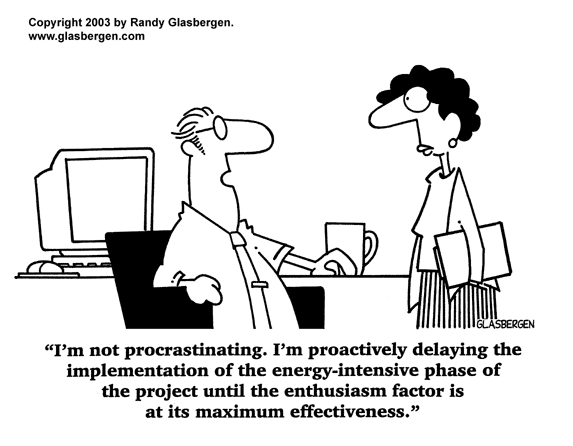Most of us do at least a little of it every day.
Procrastinate.
We tell ourselves “I’ll get to that later” and most of the time we do. But what happens if we don’t? What if we procrastinate too long? What are the costs?
We try to convince ourselves that there’s little-to-no cost of procrastination, but there can be significant costs, some very tangible, others more subtle.
Relationships: We’d like to think that the people closest to us know we have only the best intentions when it comes to follow-through, but what about the every day costs to our relationships that procrastinating causes? The partner that agreed to pick up the dry cleaning on the way home and procrastinates until the cleaner is closed. The parent who agreed to bake for the school event and procrastinates until it’s too late and disappoints their child by providing store-bought treats instead of the home-made they’d promised their classmates. The friend that promises to make a dinner reservation for a special event and procrastinates until the restaurant can’t accommodate the request. Yes, these are all small things, but significant in relationship-building. Cost of procrastination: Trust.
Health: As a breast cancer survivor, I am keenly aware of the cost of putting off health-related appointments. Regular health screenings and preventative maintenance, like flu and pneumonia shots, are critical to our well-being so they shouldn’t be put off. Use whatever strategy works to get things done: schedule mammograms with a girlfriend then go to lunch; schedule all the appointments on your birthday as a gift to yourself; schedule a massage or a round of golf after all the appointment are complete. You get the idea, whatever works to motivate. Cost of procrastination: Poor health.
Household Chores: I don’t know anyone that likes to clean the gutters. Cleaning gutters involves a ladder, dragging it around the house, possibly getting on the roof (I recommend hiring an expert if your gutters need to be cleaned from the roof or if the ladder is too high), and smelly, wet leaves. And, as gutter-cleaning procrastinators, we generally end up doing it in the rain and at night since that’s when we notice that the drainpipes are overflowing. Wouldn’t it have been much easier to have cleaned the gutters on a nice, sunny Saturday before the rain starts? From personal experience, I can tell you it is. And it’s not just gutters we need to worry about. Not cleaning furnace filters will result in reduced productivity and higher energy bills. Not cleaning the dryer vents may result in a lint fire. Not checking the water softener will result in spotty glasses. The list goes on and on. Cost of procrastination: Stress, money, and safety.
Home/Car Repairs: It’s a fact of life, things break. Whether it’s the toaster, the sink, or the car, stuff just happens and we have to deal with it. The cost of not fixing or replacing a faulty toaster could mean no toast in the morning or getting shocked while trying to retrieve the toast with a kitchen fork (strongly NOT recommended!). The costs of not fixing a leaky sink could be just a minor annoyance to extensive damage to flooring, cabinetry or walls. The cost of not addressing squeaky brakes could be devastating to the safety of ourselves and our loved ones. Cost of procrastination: Money, major home/car repairs, and safety.
Organization (my personal favorite): According to a study conducted by a Boston marketing firm, the average American burns 55 minutes per day – roughly 13 days a year – looking for things they know they own but can’t find. Disorganization manifests itself in many ways: wasted time because we can’t find things; finance charges because we didn’t pay our bills on time; late fees for not returning a library book or DVD; money wasted replacing things we already own because we couldn’t find them when we needed them; and trust because we didn’t finish a project on time due to dysfunctional time management. Being organized means we can find things when we need them, we can do the things we need to do when they need to be done, and we can get the places we need to get on time. Cost of procrastination: Time, money, and trust.
Wills: Not that any of us want to think about it, but at some point, our earthly possessions will need to be passed on to someone else. It’s true, as cool as our stuff is, we can’t take it with us. Wouldn’t it be fantastic if we had some say in where our cool stuff went? Well, that’s what wills are for. A number of surveys recently showed between 55% – 64% of of Americans had not written their wills. That number doesn’t surprise me at all. It should, but it doesn’t. None of us want to think about death and dying, but it is irresponsible to our loved ones not to take care of this important process. Cost of procrastination: Money, Relationships.
Financial Planning: Detailed and thorough financial planning is critical to our long-term well- being. When we are in our twenties and thirties, we can’t see past a new pair of jeans, let alone think about planning for our retirement. Those days just seem too far away, but it’s never too early to start planning for our retirement. What’s the benefit of starting early? Using the compound interest calculator, I wanted to see how much a relatively small investment could grow over time. I started with $1,000 and estimated that I’d put in an additional $50 per month (about 10 lattes with a generous tip) and calculated the growth over 10 years at a 5% interest rate. What would I have at the end of that time period? $9,175.63. Change it to 20 years and the number becomes a staggering $22,492.87. Amazing what a little planning and discipline could do for our long-term financial well being. Cost of procrastination: Limited Retirement Savings, Reduced Retirement Enjoyment.
Taxes: According to a CBS News post, the cost of waiting until the last minute to file income taxes costs on average an additional $400. It’s not that we can just choose to not pay our taxes by April 15 (give or take). (Well, some folks may, but I’m guessing the cost of that decision is much greater than $400.) We are just delaying the inevitable. If we thought we were getting money back on our taxes, we’d be Johnny-On-The-Spot when it came to filing our taxes, right? Not necessarily. Procrastinators are procrastinators, and whether we think we are getting money back or having to give Uncle Sam money, we generally wait until the last minute to do it anyway. In addition, the extra $400, the stress of not knowing takes a tremendous toll. Cost of procrastination: Money, stress.
Business Costs: A 2012 CNBC post identified the cost of procrastination in business as being a staggering $10,396 . . . . per employee . . . per year. Wow! The article referred to procrastination as “the most invisible cost in business today.” I don’t doubt it. When I worked in “Corporate America,” I surely procrastinated a bit on projects that I knew needed to get done, but I just didn’t feel motivated to do. Why did I procrastinate? Generally, I felt I didn’t know enough about the project to get started, didn’t feel I had the appropriate resources to get the project completed, or just found other stuff that was more fun to do. Cost of procrastination: Money, Credibility, Possible Promotion
Insurance: After procrastinating on the project for a couple years, we went through a comprehensive analysis of our home insurance needs. After extensive research, we found an amazing insurance package that was far less in cost with far more coverage. Had I gone through the process a few years earlier, we would have been able to save several thousand dollars AND had more extensive coverage. It sickens me to think of what I might have been able to do with that money. The same goes for renewing any kind of insurance: auto, home, personal liability, health, etc. I worked with a client several years ago that hadn’t done a detailed review of their business auto insurance in several years. After an analysis of their coverage, it was determined that two of their vehicles hadn’t been included in the policy. Can you imagine the cost had there been an accident with one of those vehicles? Frightening. Cost of procrastination: Money, Peace of Mind, Liability
Fortunately, procrastination can be managed. It requires scheduling, initiative, and a drive to do better, but it can be done.
The best way to stop procrastinating? Just get started. Starting small will provide the momentum to finish. Unfinished tasks are uncomfortable for us. Once we get started, we have the drive to finish.
Cindy Jobs, COC, ACC
Looking for more information?
Click here for 15-minute organizing tips.
National Association of Productivity & Organizing Professionals, Seattle Chapter Vice-President
International Coach Federation
Institute for Challenging Disorganization
Level I Certificates earned in Chronic Disorganization; ADD; Client Administration; Time Management; Mental Health; and Hoarding.
Level II Specialist Certificates earned in Chronic Disorganization and ADHD








